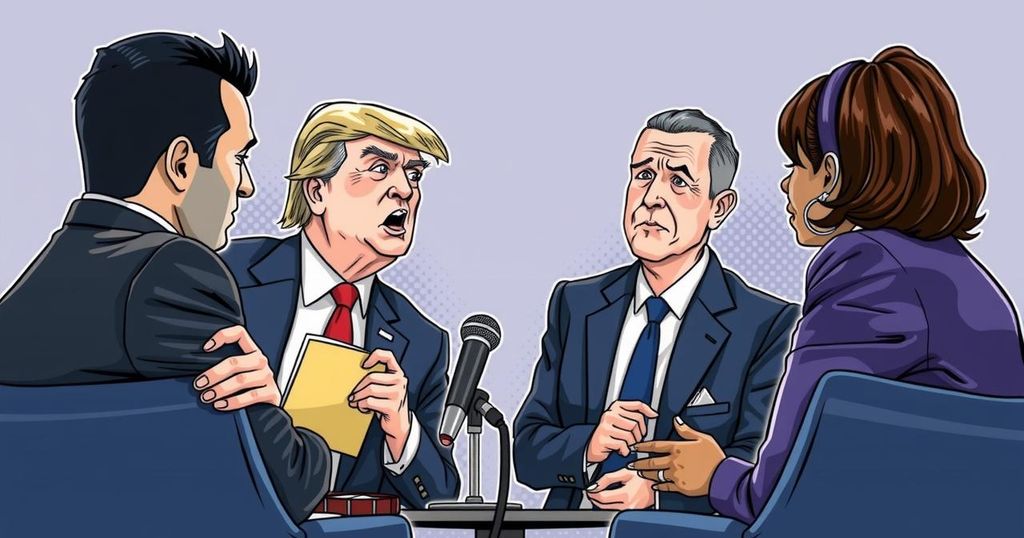This article discusses the potential response of Australian Prime Minister Anthony Albanese in light of a possible Trump victory in the U.S. election. It emphasizes the deep divisions in American society, Trump’s unorthodox foreign policy approach, and the significance of Australia engaging proactively with the U.S. to fortify bilateral relations and regional security partnerships. The piece underscores the importance of Australia’s diplomatic influence and trade relationships in a changing global context.
The future of American democracy is approaching a critical juncture as the electoral process unfolds. With support for candidates divided closely across lines of gender, race, education, and geography, the ultimate voter turnout will play a decisive role in determining the victor. This division is reflective of deep-seated political fractures, with a dwindling number of independents in the political landscape. Former President Donald Trump has successfully identified and expressed the sentiments of many Americans who feel alienated from their own country, exhibiting skepticism towards institutions, and desiring a return to a governance style that resonates with their values. The rise of social media has intensified these divisions and rekindled cultural and identity conflicts reminiscent of a past era disrupted by immigration and the expanding of rights without corresponding responsibilities. The core of Trump’s support is centered on prioritizing national interests, characterized by a reluctance to engage in international conflicts or uphold abstract ideals like the global rules-based order. Supporters view Mr. Trump as a pragmatic deal-maker. He embodies a chaotic approach to foreign policy, portrayed as a strategy that could bring about global stability by keeping other leaders uncertain about his responses. This chaotic method extends to his handling of issues such as Taiwan and Ukraine, suggesting that his unpredictability could deter foreign aggression. In terms of trade, Mr. Trump’s mercantilist views stress the necessity of favorable bilateral agreements, reflecting a long-standing antagonism towards free trade principles. However, he may offer some leniency towards nations like Australia, given the existing trade relationship. In the event of a Trump victory, Australian Prime Minister Anthony Albanese should promptly consider a diplomatic visit to Washington. Engaging in pre-visit discussions with close regional partners, particularly Japan, will be crucial. It remains imperative for Australia to assert its influence in U.S. foreign policy without diminishing its autonomy and integrity. Australia should emphasize the importance of maintaining security and economic collaborations in the Indo-Pacific region, reinforcing the benefits that American engagement brings. By fostering regional partnerships and participating in multi-national discussions that reflect shared values, Australia can support both its national interests and American strategic goals. Historically, when the U.S. opts out of global frameworks, such as the Trans-Pacific Partnership, countries like Australia have taken initiative to fill the void, demonstrating their capability in multilateral trade processes. Further complicating the trade landscape is the reality of rising tariffs and trade deficits, which have broader implications for American economic health. A hard-nosed approach to trade could have unintended consequences detrimental to domestic job markets and inflation rates. The global order that America stands to protect is not merely theoretical; it is integrally connected to its national security and positioned within a larger network of allies and partners predicated on shared democratic ideals. American soft power, underscored by cultural values, is essential for legitimizing its military capabilities on the global stage. Ultimately, as the calculus of foreign policy evolves, it is crucial to recognize that wisdom extends beyond Washington, and Australia possesses valuable insights to contribute.
The article examines the complexities of the current American political landscape amid an upcoming election that could see former President Donald Trump regain power. It highlights the structural divisions within American society, the evolving role of social media in politics, and the implications of Trump’s foreign policy and trade strategies. The article positions Australia as a significant ally, emphasizing the importance of diplomatic engagement should Trump be re-elected, while asserting Australia’s capabilities to contribute meaningful perspectives in international relations.
In conclusion, the pathway to securing Australia’s interests in a potentially Trump-led United States hinges upon proactive diplomatic engagement. By prioritizing dialogue about the region’s security architecture and emphasizing the importance of America’s network of alliances, Australia can play a crucial role on the global stage. It is imperative that Australian leadership maintains its autonomy while fostering relationships beneficial to both nations. This approach not only solidifies Australia’s standing as a reliable ally but also contributes to the stability of the international order amid growing geopolitical challenges.
Original Source: www.theguardian.com







